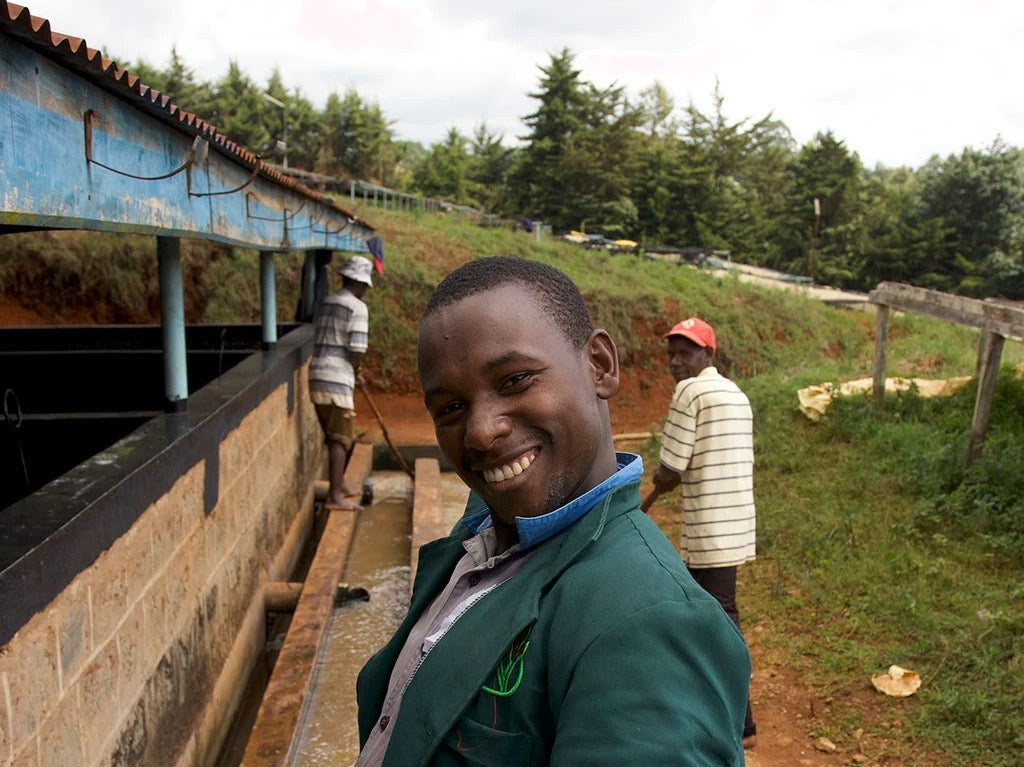
AA GATOMBOYA / KENYA
AA Gatomboya / ケニア
Flavor Profile :
Red currant,Raspberry,Assam tea, Cane sugar.
Origin: Kenya
Factory: Gatomboya Factory
Cooperative: Barichu *Farmers Cooperatibe Society
Producers: about 600 smallholders
Region: Nyeri ( ニエリ)
Variety: Batian, SL-34, Ruiru 11, SL- 28
Process: Washed
Altitude: 1800ml
Harvest: 2022-2023
This coffee has the fruity flavor of red currants and berries typical of Kenyan coffees, while also presenting a soft impression reminiscent of black tea and a mellow, sweet finish. Gatomboya Factory (the mill that processes the coffee cherries) belongs to the Barichu FCS located in Nyeri, in central Kenya. Nyeri is known as a region that produces complex, full-bodied Kenyan coffees. "Gatomboya" is a Kikuyu word meaning "wetland," indicating that the wet soil conditions are well-suited for coffee cultivation.

At this factory, coffee cherries are collected from around 600 small-scale farmers in the surrounding area, producing about 350 tons of parchment coffee annually. These farmers cultivate coffee on an average of 0.4 hectares of land and deliver their harvested cherries to this facility. Notably, there are around 700,000 small-scale farming households across Kenya, accounting for 55% of the country's coffee production. The annual rainfall in this region is around 1400mm, with temperatures ranging from 14°C to 25°C. The volcanic soil found on the slopes of Kenyan mountains is called "Nitosol," a fertile, volcanic-derived soil considered more suitable for coffee cultivation than soils in other tropical areas. The coffee flowering season is February-March, with the main harvest occurring from October-December. The harvested coffee is primarily traded between January-April.

Kenya produces some of the world's highest quality washed coffees, with a unique Kenyan characteristic being the "soaking" process where the parchment coffee is immersed in fresh water before drying for the finest qualities. Fresh water drawn from the Gatomboya River is used in the fermentation and washing processes. After harvesting, the cherries are hand-sorted to remove any underripe or overripe beans before processing. Using premium disc pulpers, the skin and pulp are removed, and the beans are graded into three densities. Grades 1 and 2 undergo separate fermentation (mucilage removal) for 16-24 hours in the shade. They then go through density grading channels and a washing process. Next is the "soaking" stage where the parchment coffees are immersed in fresh Gatomboya River water for 16-18 hours. After soaking, they are initially dried on hessian meshes before being moved to traditional African beds for 12-20 days of sun-drying. These beds are typically covered with jute fabric or wire meshes. During drying, the beans are covered with plastic sheets day and night, with the total drying time sometimes reaching up to 21 days.

At the dry mill facility, the parchment skin is removed, rigorous sorting takes place, and the final packaging is done. Kenya's dry mills are regarded as efficient and of a high standard. Since all the coffee delivered from a single washing station is graded at the mill, the quality of each outturn can be verified through cupping. If any issues are detected during sorting, the coffee can be processed again. One advantage of Kenya's coffee marketing system is that all coffees are properly graded, and in the case of direct trade, producers can obtain prices higher than the auction prices. The system is transparent, allowing verification of costs deducted from coffee sales proceeds. Diligent cooperative societies strive to maximize deliveries and increase farmer payouts up to 90%.




